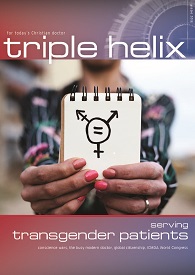What do the current drives for assisted suicide, abortion on demand, same-sex marriage, transgenderism, robot rights and presumed consent for organ donation have in common? They are certainly all backed by 'progressive' secularists who occupy the corridors of power. But more specifically they are all based on a sub-Christian view of the human body.
The body is central to the biblical world view and interest in it is being revived by two challenging new books, both written by evangelical Christian academics. (1),(2)
Jesus Christ is God incarnate - the Word made flesh. He appears in Old Testament theophanies, such as the narrative of Sodom and Gomorrah. (3) He enters history as a baby, dwells among us and as an adult is crucified and dies. Furthermore, he is resurrected not as a disembodied spirit but with a real living body that can be seen and touched, that eats fish and lights fires on the beach, and yet it seems, can appear and disappear at will and enter locked rooms without using a door. Jesus's new body, unlike ours, is indestructible and no longer subject to 'death or crying or pain'. (4) But he promises that we will receive similar bodies after the resurrection. (5)
The Bible paints a high view of the body, encapsulated in two unparalleled short verses in the creation narrative.
'So, God created mankind in his own image, in the image of God he created them; male and female he created them.' (6)
The Bible is unashamedly binary - 'male and female'. We are 'created', not a cosmic accident ?but the product of intelligent design, made for a purpose.
'Then the Lord God formed a man from the dust of the ground and breathed into his nostrils the breath of life, and the man became a living being.' (7)
We are constructed from material elements - the dust of the ground - but we are more than just organised anatomy, physiology and biochemistry. We are animated by God's breath. We are neither disembodied souls nor soulless bodies. Rather we are embodied souls or ensouled bodies, an indivisible whole.
All sub-Christian ideologies distort these simple principles. Materialism denies the existence of anything beyond our senses, and like Plato's Protagoras makes man 'the measure of all things'. (8) It values human beings by their neurological capacity and dreams of one day creating human consciousness through technology.
Gnosticism denies the importance of our bodies, and hence what we choose to do with them. It is the soul that is ultimately important. Greek dualism values both body and soul but sees them as separate entities which part from each other at death. Eastern pantheism looks to the day when we will be free from the limitations of the body. Spiritism idealises the disembodied soul.
Such schemes provide a fertile seedbed for distorted ethical objectives. If human beings are to be valued, based on their capacity for communication, relationship or intellectual function, then those at the beginning or end of life, or disabled by disease or injury, are simply human 'non-persons' - biologically human but not beings with rights. It is this view that lies behind the idea that we can do things to embryos, fetuses and people with brain damage or dementia that we would not contemplate doing to healthy children or adults.
If gender is simply an arbitrary social construct, rather than the cultural expression of biological reality, and gender identity is determined by our thoughts rather than our chromosomes, then the use of 'therapeutic' puberty blockers, cross-sex hormones and 'gender reassignment surgery' is not problematic. If our bodies are not gifts of God, given to us by him to steward in accordance with his moral direction, then we can use them for any purpose we choose, whether it is in line with the function implied by their structural design or not, and others, even the State, can choose how to use them after our deaths.
By contrast, Christianity holds a high view of both body and soul and a high view of morality. Our bodies are temples of the Holy Spirit, instruments entrusted to our care. We are 'not our own'. (9) We are instead to worship God in our thoughts and actions, submitting our bodies to him as living sacrifices and honouring him in the way we use them. (10) From conception to death, each of us, as divine image bearers are worthy of the utmost love, respect, empathy and protection. Each part of our bodies, including our sexual organs, are designed for a specific purpose. Although marred by the effects of the Fall, we look forward to the day when we will be clothed again with imperishable bodies, constructed for life in a new heaven and new earth. (11),(12)
As Christian doctors and nurses we are immensely privileged both to learn of the intricacies of our amazing bodies and to know from the Scriptures about their true nature and purpose. Sadly, many churches have lost a biblical theology of the body and this perhaps accounts for their moral uncertainty when it comes to responding to ethical views based on false ideologies.
From those to whom much has been given, much will be required. (13) Perhaps Christian doctors and nurses should be taking the lead in addressing this theological and moral confusion.
Peter Saunders is CMF Chief Executive
































